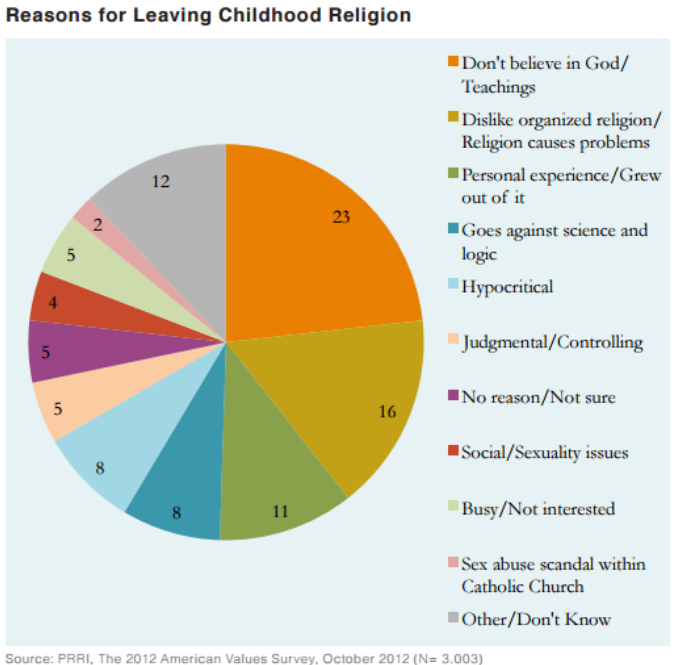The weekly report on research and demographics of the secular movement
by Julie Esris
This past week, The Huffington Post reported on Leah Vincent, author of Cut Me Loose: Sin and Salvation After My Ultra-Orthodox Girlhood. VincentÔÇÖs memoir chronicles her upbringing in Ultra-Orthodox Judaism, being disowned by her family, and her eventual rejection of the Jewish religion altogether. She is just one of many young adults today who, in record numbers, are leaving the religion in which they were raised. In fact, many other books about leaving behind fundamentalist religion have been published: Escape, by Carolyn Jessop; Stolen Innocence, by Elissa Wall; Infidel, by Ayaan Hirsi Ali; and many more. Although not all secular people were raised in fundamentalist religionÔÇöor even raised in religion at allÔÇöthese books reflect a gradualÔÇöbut clearÔÇösecularization of young Americans.
It is all but clich├® to note that Americans are exceptionally religious. However, Secular Policy InstituteÔÇÖs recently released Secular Resource Guide documents a steady decline of religious affiliation, particularly among young people. A little over a third (34%-36%) of young Americans born between 1981 and 1996 are unaffiliated with any religion. More than a quarter (28%) of college students claim no religion, and a fifth (20%) of eighth- to tenth-graders are also unaffiliated. As illustrated in the aforementioned books, many young adults who grew up in religious environments eventually rejected religion entirely. Those who went from religious to unaffiliatedÔÇöwhether or not they ultimately became atheistsÔÇödid so for a variety of reasons. The most common reason (23%) those surveyed reported for leaving religion was that they do not believe in God and/or the religionÔÇÖs teachings. A reported 16% dislike the concept of religion and believe it causes serious problems, such as war. Oddly enough, 12% say that they are not sure why they have left religion. 11% claimed to have ÔÇ£outgrownÔÇØ religion. A variety of other reasons for leaving religion include: it goes against science and logic (8%), it is hypocritical (also 8%), it is judgmental and controlling (5%), lack of interest (also 5%), social issues (such as positions on divorce) or issues relating to sexuality (4%), and sexual abuse scandals within the Catholic Church (2%).┬á
It is very clear that todayÔÇÖs drop in religious affiliation is largely due to people leaving the religions in which they were raised. Indeed, while a 2012 Pew study reveals that generational replacement is the most powerful driving force for AmericaÔÇÖs decline in religiosity, one must give consideration to those who were raised religious but eventually distanced themselves from religion. An article recently published in MIT Technology Review credits the Internet and increased college attendance for this phenomenon. College attendanceÔÇöwhich exposes young people to a variety of new ideas and culturesÔÇö has risen from 17.4% in the 1980s to 27.2% in the 2000s. However, it only accounts for 5% of the drop in religious affiliation. According to the article, the evidence strongly suggests that the Internet is far more responsible for creating AmericaÔÇÖs most recent apostates.
Why is the Internet such a driving force in leading people away from religion? Like going to college, using the Internet exposes people to new cultures and ideas, and all without having to leave home. People who have doubts about religion or who have left religion tell their stories on YouTube, Facebook, Twitter, and other social networking sites. Twenty years ago, the Internet was mostly text with low-resolution graphics. TodayÔÇÖs InternetÔÇöwhich is more interactive than everÔÇöputs a human face on those leaving religion, figuratively but also literally. In a YouTube video, for example, one sees a high-resolution video of a young man weeping about having been disowned by his family for being an atheist but also feeling relieved that he is no longer afraid ofÔÇöor even believes inÔÇö hell. In addition to the human aspect of the Internet, there are also several websites that debunk misconceptions about ideas that are largely considered anti-religiousÔÇösuch as evolutionÔÇöand identitiesÔÇösuch as homosexualityÔÇöthat many religions consider sinful. Traditionally, when religious parents have shielded their children from the outside world, they banned certain books and television programs. Some religious families do not even own televisions. But today it is difficultÔÇöif not impossibleÔÇöto not have access to a computer. Even if a religious household does not have a computer, a child can use one at a friendÔÇÖs house or go to the library. As the meme says, the Internet is where ÔÇ£religion comes to dieÔÇØ.
Start surfing.

